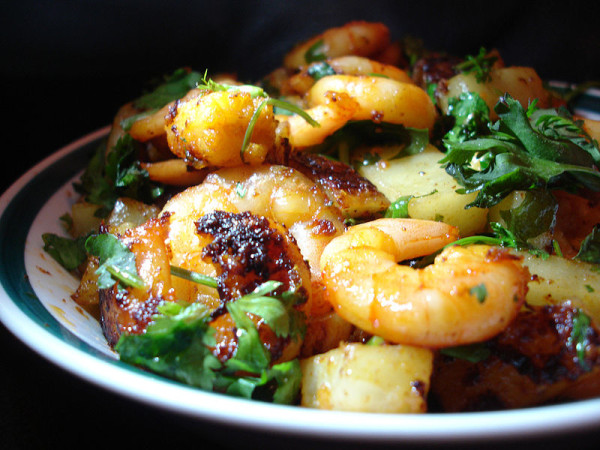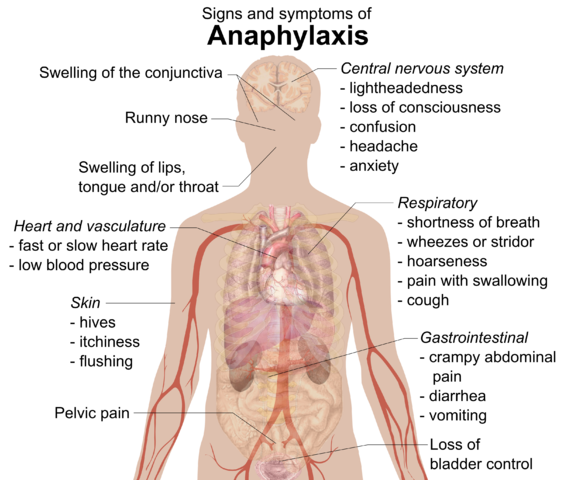 My father developed an allergy to shrimp, one of his favorite foods. When he ate shrimp anyway, my mother warned him in Tagalog that he would get itchy. “Then I’ll scratch,” was his reply. While I laugh when I think about that story, for other Asian Americans, reactions to food allergies are not at all funny. 18 year old BJ Hom died from eating a dessert that he did not know contained peanuts. A recent article by Grace Hwang Lynch (of the Hapa Mama blog) points out that Asian American children are 40% more likely to have food allergies than the general population, according to this 2011 study published in the Journal Pediatrics, but less likely than whites to have a confirmed food allergy diagnosis. She also mentions that Asian American food allergies tend to be different from those of other Americans.
My father developed an allergy to shrimp, one of his favorite foods. When he ate shrimp anyway, my mother warned him in Tagalog that he would get itchy. “Then I’ll scratch,” was his reply. While I laugh when I think about that story, for other Asian Americans, reactions to food allergies are not at all funny. 18 year old BJ Hom died from eating a dessert that he did not know contained peanuts. A recent article by Grace Hwang Lynch (of the Hapa Mama blog) points out that Asian American children are 40% more likely to have food allergies than the general population, according to this 2011 study published in the Journal Pediatrics, but less likely than whites to have a confirmed food allergy diagnosis. She also mentions that Asian American food allergies tend to be different from those of other Americans.
Like my father, Asian Americans (and Asians, according to the Asian Pacific Allergy Report) are more likely to be allergic to shellfish than other Americans. The report also says that the incidence of food allergies is comparable in Asia as in the United States. That finding makes me wonder why Asian Americans have a higher incidence of food allergies, but I couldn’t find a cause in the reports. In my family, The Wife is allergic to certain shellfish, and my sister-in-law, who is Chinese, is also allergic to shrimp.
Lynch’s article talks about many of the challenges that parents of children with food allergies face, such as constantly have to read food labels and checking on how food is prepared. Cultural differences can add challenges. Sometimes family members do not understand when food allergies have to be dealt with, and it can be hard when traditional favorites cannot be eaten. In the article, Lynch cites Dr. Jae Rin Park, who has three children with multiple food allergies, including one child who cannot consume soy sauce. “I miss cooking certain dishes like bulgogi or kalbi,” she says. I know I would miss kalbi, and I am not even of Korean descent!
 If you or another family member have or suspect that they have a food allergy, it is recommend that the affected person be tested by an Allergist. The Pacific Allergy report notes that studies based on self-reported allergies tend to overestimate the incidence of real allergies. Those with allergies will need to diligently check for ingredients in foods, as reactions such as anaphylaxis can be fatal. If indicated by the allergist, they should have an EpiPen ready for when food to which they are allergic is accidentally consumed. Lynch’s article has more information on the challenges of food allergies and how you can deal with and contribute to the battle against food allergies.
If you or another family member have or suspect that they have a food allergy, it is recommend that the affected person be tested by an Allergist. The Pacific Allergy report notes that studies based on self-reported allergies tend to overestimate the incidence of real allergies. Those with allergies will need to diligently check for ingredients in foods, as reactions such as anaphylaxis can be fatal. If indicated by the allergist, they should have an EpiPen ready for when food to which they are allergic is accidentally consumed. Lynch’s article has more information on the challenges of food allergies and how you can deal with and contribute to the battle against food allergies.
This is story is part of an occasional series on health hazards that are unique to Asian Americans or affect Asian Americans much more than the general population.
(prawns photo credit: rovingi licensed under the Creative Commons Attribution 2.0 Generic license.)
(anaphylaxis photo credit: Mikael Häggström released into the public domain)
- Excited
- Fascinated
- Amused
- Disgusted
- Sad
- Angry








